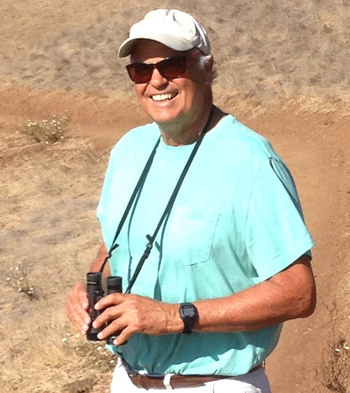In Memoriam, Ted J. Case, 1947-2015
April 5, 2016

Ted J. Case, professor emeritus and former chair of the UC San Diego Department of Biology, died of a sudden heart attack while trail running on December 31, 2015. He was 68.
His research career spanned four decades and focused on evolutionary ecology, biogeography, conservation biology and community ecology.
Ted was exceptional among biologists in being both an accomplished mathematical theoretician as well as an adept field empiricist. Recognition of this was indicated through his many awards, including a Career Achievement Award from the University of Redlands in 2000, and his election into the American Academy of Arts and Sciences in 2004.
Ted’s research was wide-ranging. Major topics included: the evolution of animal body sizes on islands; the evolutionary and ecological consequences of sexual vs. asexual reproduction; competition, niche evolution, and the structure of biotic communities; the evolution of species ranges; diversification and extinction on islands; mechanisms of species invasions; and the biodiversity of Southern California. While chiefly known for his work on reptiles, particularly chuckwallas and geckos, Ted also studied ants and rice field mosquitoes. His research was funded by the National Science Foundation and other major granting agencies for several millions of dollars over the decades. He did research on five continents and over 50 islands.
Ted published more than 140 journal articles, seminal books, and book chapters. His work was regularly published in the world’s top journals such as Science, Nature and Proceedings of the National Academy of Sciences USA. His scientific career was successful from its inception.
“A polymath of population biology, Ted’s early work on the vulnerability of coevolved ecological communities to the deletion of resident species or the addition of alien species proved of ever growing importance and economic significance,” said Michael Gilpin, an emeritus professor of biology. “Working with me in the 1970’s, about the time the Endangered Species Act was passed, our theoretical models, often ground-truthed with tragic examples from island ecosystems, were soon guiding reserve design and planning for managing endangered species. Thirty years later, Ted was importantly contributing to the maintenance of biodiversity in San Diego as part of the interagency Multispecies Habitat Conservation Plan.”
As a testament to biogeography, his work with Martin Cody to synthesize all current and past research on the Sea of Cortez, culminated in the 1983 book, “Island Biogeography in the Sea of Cortez,” which inspired a generation of students as a knowledge framework for the region and illustrated his visionary perspective.
Ted’s keen grasp of the behavior and utility of mathematical models exemplified his work throughout his career. In fact, the difficulty student’s had with the theoretical content of his UC San Diego ecology class prompted him to write the widely appreciated text “An Illustrated Guide to Theoretical Ecology” (Oxford Press, 2000), which introduced a new generation of scientists to what Ted called “the hard bits” of ecology in an unusually accessible, yet thorough, manner.
Because of his expertise in both theoretical ecology and field biology Ted was highlighted in David Quammen’s 1996 book “The Song of the Dodo: Island Biogeography in an Age of Extinction,” and received praise from U.S. Secretary of Interior Bruce Babbitt after his reading passages about Ted.
Ted was often sought as a consultant on management issues and served on a variety of scientific panels. He was selected by the president of the Ecological Society of America to review the management plan for the California spotted owl, served on founding the Scientific Advisory Board for the NSF National Center for Ecological Analysis and Synthesis, was appointed as a member of the core group for planning research priorities for the California Natural Communities Conservation Program (NCCP), and was appointed to the National Marine Fisheries Service Science Review Panel by the National Research Council to review recovery efforts for endangered salmon species.
Ted was also an environmental activist during and after his research career.
He consulted with multiple agencies and provided expert testimony on scientific methods such as the environmental analysis on the Exxon Valdez oil spill lawsuit, 1994. He served as a scientific witness for joint Assembly-Senate hearings reviewing the California Endangered Species Act, Sacramento, 1995. He was on the Scientific Advisory Committee for the Placer County Habitat Conservation Plan, from 1998 to 2000. He was also co-chair of the Forest Initiative for San Diego County, October ballot, 1993. That measure was passed overwhelmingly by the voters of San Diego County.
Ted was the major advisor for eight Ph.D and several M.S. students. Seven of Ted’s Ph.D. students went on to become professors at major universities, one also became a dean, and one co-founded a major environmental firm. His nine postdoctoral students also hold professorships at top universities or high level environmental positions in private and public agencies. Many of his former M.S. and undergraduate students hold professorships and key scientific positions at major research institutions and agencies.
Ted was born in 1947 in Sioux City, Iowa. He received a bachelor’s degree from the University of Redlands in 1969, where he won a Woodrow Wilson Fellowship, and a Ph.D. from UC Irvine in 1974. He did post-doctoral research at UC Davis. He accepted a faculty position at Purdue University in 1975 and joined the UC San Diego faculty in 1978 retiring in 2004. He is survived by his wife, Benita Epstein, son Ted Nathan Case of Pismo Beach, CA, son John Dustin Case of Paradise, CA, granddaughter Justine of Paradise, CA, brothers Timothy Case of Sioux City IA, Thomas Case of Iowa City, IA, Tobin Case of Des Moines, IA, and sisters Margaret Case of Indianola, IA and Polly Case of West Des Moines, IA.
